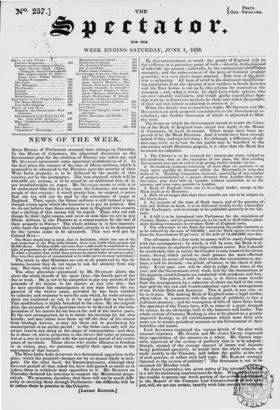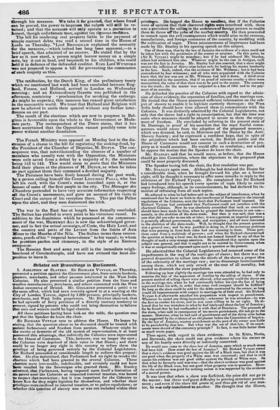NEWS OF THE WEEK.
BOTH Houses of Parliament resumed their sittings on Thursday. In the House of Commons, the adjourned discussion on the Government plan for the abolition of Slavery was taken up; and Mr. STANLEY announced some important moditicaticns of it. In the first place, the interest of the loan of fifteen millions, which is Proposed to be advanced to the Planters upon the security of their West India property, is to be defrayed by the people of this country, not by the mortgagees. The sum required, which will be 600,0001. per annum, is to be raised by an additional duty of 38. per hundredweight on sugar. Mr. STANLEY seems to wish it to be understood that this is a tax upon the Colonists, not upon the people of this country : it would puzzle him, we suspect, to prove that the tax will not be paid by the consumers of sugar in England. Then, again, the fifteen millions is still termed a loan, though a loan upon which the borrower is to pay no interest. But we do not believe that there exists a man in England who expects that a shilling of this money will be repaid. Then why not call things by their right names, and avow at once that we are to pay fifteen millions to the Planters as a compensation for the loss of their property in Slaves? The whole scheme is in fact impracti- cable upon the supposition that landed security is to be demanded for the various sums to be advanced. This was well put by Colonel HAY—
The House should bear in mind, that in Barbadoes, which was one of the most important of the West India Islands, there were 5,000 white persons and 60,000 slaves. Of these 5,000, not more than 1,500 could be considered in the light of proprietors, for all the others were owners of only one or two slaves each. In what a situation then would these persons be placed under the present plan? How was their portion of remuneration to be doled out to so many individuals?
The truth is, that Ministers are not at all perplexed by this di- lemma, because they do not mean to ask for security from any one. But then, why not say so?
The other alteration announced by Mr. STANLEY allows the slave the whole benefit of his spare time—the fourth part of the day or week. He is not to be compelled to pay any portion of the proceeds of his labour to his master or any one else; but he may purchase his emancipation at any time before the ex- piration of the twelve years, provided he has been enabled by industry and economy to save the sum which, by some arrange- ment not explained as vet, is to be put upon him as his price. This modification is highly beneficial to the slave. By the original plan, the proceeds of his spare time were to be devoted to the com- pensation of his master for his loss at the end of the twelve years. By the new arrangement, he is to retain his earnings for his own benefit; and may either save them up till the time of his release from bondage arrives, or may lay them out in purchasing his .emancipation at an earlier period : in the latter case only will his 'owner receive any thing in the shape of remuneration—and that, be it obseued, not in proportion to the slave's full value at present, but at a rate to correspond with the unexpired period of his twelve years of servitude. Those slaves who prefer idleness to freedom or to riches, may, we presume, employ their spare time in the enjoyment of that luxury.
The West India body persevere in a determined opposition to the plan; which the proposed changes are by no means likely to miti- gate. On the other hand, the Emancipationists, although they have not gained all they asked for, have still gained so much as to induce them to withdraw their opposition to it. Mr. BUXTON on Thursday declared his intention to support the Ministerial propo- sitioris. We pre,sume, therefore, that there will not be much diffi- culty in carrying them through Parliament: the dit4culty will be to reduce them to practice in the Colenies, - By this arrangement, as usual, the people of Englaiiil _will be the Sufferers in a pecuniary point of vielv,—directly, ti the...animint of 600,C001. per annum ; indirectly, by the continuance of thel'snar monopoly, and the enhancement of the price of Colonial prodiice generally, to h very Much larger arnouni.. This view of tbe;i1u4- tion is sickening. All hope of relief to the distressed mannfactOr- ing population from ,the opening of new mai-kets in South America and the East Indies is cutup by this scheme for continuing the monopoly ;. and,.Ny hat, js.worse,'.we.„shall force whole nations, who are now valuable cns'iimers, and' would lady eXtenblicir.de,al- ings with us, to desert our markets for those into which the.prottuce of their soil and labour is admitted in return.* 1;:r When the debate was resumed last night, Mr.GonsoN and Mr.- BUCKINGHAM each proposed amendments to the Government re- solutions; the further discussion of which is adjourned to Mon- day next. The terms on which the Government intend to renew the Char- ter of the Bank of England were stated last night in the House of Commons, by Lord ALTHORP. These terms have been ap- proved of by the Bank Directors. And it would have been strange indeed if they had rejected them ; for although a difference of opi- nion may exist as to how far the public may be benefited by the alterations which Ministers propose, it is clear that the Bank has no reason to complain.
I. The Charter is to be renewed for twenty-one years, subject to this condition, that at the expiration of ten years, the then existing Government may put an end to it by giving twelve months' notice.
2. No banking company consisting of more than six partners is to issue notes payable on demand within the Metropolis or sixty-five miles of it. Banking Companies, however, consisting of any number of partners established at a greater distance from London than sixty- five miles, may draw bills on London without restriction as to the amount, and issue notes payable in London. 3. Bank of England notes are to be a legal tender, except at the Bank itself or its Branches.
4. Bills of no longer date than three months are not to be subject to the Usury-laws. • •.1 5. An account of the state of Bank issues, and of the quantity of,. coin and bullion on hand, is to be delivered weekly to the Chancellor of the Exchequer, and an average to be published quarterly in the Ga- zette.
6. A bill is to be introduced into Parliament for the regulation of Country Banks; and its provisions are to be such as shall induce joint- stock banking companies to circulate Bank of England notes.
7. The allowance to the Bank for transacting the public business is to he reduced by the sum of 120,000/. ; and the Bank agrees to receive from the Government 25 per cent. of the debt of 14,500,000/. now due.
The advocates for a free trade in money will be sorely displeased with this arrangement ; by which, it will be seen, the Bank is al- lowed to retain its exclusive privileges almost entire. But it should be recollected, that in reality the Charter is only renewed for eleven years during which period we shall possess the most effectual
check its issues of money, that under the circumstances, per-
haps, could be devised,—we allude, of course, to the check of pub- licity. Every man now will be able to judge four times in the year, and the Government every week, how far the transactions of this gigantic establishment are conducted with prudence and fore- thought. The public, it will be seen, is to derive some benefit from the arrangement, by a reduction of about one half of the sum now paid for the risk and trouble attendant upon the management of the Public Debt and Accounts. This is good, at any rate, as far as it goes. The making Bank of England notes a legal tender,
when taken in connexion with the system of publicity, is also a judicious measure ; and the exemption of bills of short dates from the operation of the Usury-laws, will, in times of .a great demand for money, be an advantage both to the borrower and lender. The whole system of Country Banking is also to be placed on a greatly improved footing; as all establishments which issue their own notes are to render periodical accounts to the Government of their liabilities and assets.
Lord ALTHORP explained the various details of the plan with unusual clearness. Mr. GROTE and Mr. JOHN SMITH expressed their approbation of the measure as a whole. Mr. GROTE espe- cially approved of the system of publicity that is to be adopted; though, instead of the average amount of issues and deposits being published quarterly, he would have the whole returns, as made weekly to the Treasury, laid before the public at the end of each quarter, or rather each half year. Mr. BARING strongly. objected to the system of publicity The discussion is not to be resumed till Monday week. Sir JOHN CAMPBELL has given notice of his intent in a bill for abolishing imprisonment for debt. Wh the trouble to peruse one tenth portion of the evideac in the Report of the Common Law Commissioneg ject, will, we are arecertain, heartily wish him succ . . through his measure. We take it for granted, that where fraud can be proved, the power to imprison the culprit will Still be re- tained; and that the measure will only operate as a protection to honest, though unfortunate men, against too rigorous creditors.
The bill for rendering real property liable to the payment of simple contract debts was read a second time in the House of Lords on Thursday. 'Lord BROUGHAM explained the necessity for the measure,—which indeed has long been apparent,—in a brief speech, that admitted of no answer. He stated that by the law as it now stood, a person might borrow money on a simple note, lay it out in land, and bequeath to his children, who could bold it in defiance of the defrauded creditor. Even Lord WYNFORD -was not prepared to oppose a bill for preventing the commission Id such iniquity as this.

















 Previous page
Previous page